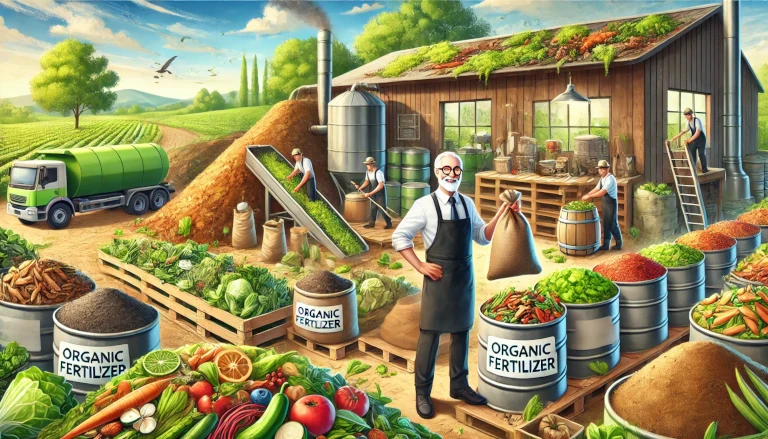Organic fertilizer production is a booming business in India, driven by the increasing demand for sustainable agricultural practices and eco-friendly products. Organic fertilizers are made from natural materials like compost, animal manure, and plant waste, providing essential nutrients for soil health and plant growth without harmful chemicals. With the government’s focus on organic farming and subsidies for eco-friendly practices, the organic fertilizer industry offers immense opportunities for entrepreneurs.
This guide provides a comprehensive look into starting an organic fertilizer production business, covering all aspects from investment to marketing strategies.
What is Organic Fertilizer Production?
Organic fertilizer production involves creating nutrient-rich fertilizers from organic materials such as:
- Compost: Decomposed plant and kitchen waste.
- Animal Manure: Cow dung, poultry litter, and goat droppings.
- Vermicompost: Fertilizer made using earthworms to decompose organic matter.
- Bio-Fertilizers: Microbial inoculants that enhance soil fertility.
Organic fertilizers improve soil structure, retain moisture, and support beneficial microorganisms, making them a key input for organic farming.
Why Start Organic Fertilizer Production in India?
There are several reasons to invest in organic fertilizer production:
- Growing Demand: With the rise of organic farming, the need for organic fertilizers is increasing rapidly.
- Government Support: Initiatives like the Paramparagat Krishi Vikas Yojana (PKVY) promote organic farming and provide subsidies for fertilizer production.
- Eco-Friendly Solution: Organic fertilizers reduce chemical dependency and improve soil health, aligning with sustainable farming goals.
- Profit Potential: High demand for organic products ensures a lucrative market for quality fertilizers.
Getting Started with Organic Fertilizer Production 🛠️
Setting up an organic fertilizer production unit requires planning and adherence to quality standards. Follow these steps to get started:
- Choose Your Production Method:
- Composting: Involves decomposition of organic materials like plant waste and manure.
- Vermicomposting: Uses earthworms to convert organic waste into fertilizer.
- Bio-Fertilizers: Requires microbial cultures to enrich soil.
- Select a Suitable Location:
- Ensure proximity to raw materials like agricultural waste and animal manure.
- Choose a location with space for composting pits and storage.
- Procure Equipment:
- Compost turners, shredders, sieving machines, and packaging units are essential.
- Follow Regulatory Guidelines:
- Obtain required licenses from the Fertilizer Control Authority in India.
- Ensure compliance with pollution control standards.
- Set Up Production:
- Create compost pits, arrange raw materials, and start the decomposition process.
Challenges of Organic Fertilizer Production ⚠️
While profitable, organic fertilizer production has some challenges:
- Raw Material Availability: Seasonal variations in crop residues and manure supply can affect production.
- Quality Control: Maintaining consistent quality and nutrient levels is crucial to compete in the market.
- Market Awareness: Farmers may need education about the benefits of organic fertilizers compared to chemical options.
- Pest and Odor Management: Composting operations can attract pests and produce unpleasant odors if not managed properly.
Financial Requirements 💰
Investment Breakdown
- Land and Infrastructure: Costs depend on location and the scale of the business.
- Raw Materials: Manure, plant waste, and microbial cultures.
- Equipment: Compost turners, shredders, packaging units, and transportation.
- Labor Costs: Workers for collection, processing, and packaging.
- Licenses and Certifications: Fees for obtaining regulatory approvals.
Profit and Loss Analysis
- Profit Potential: Organic fertilizers have high margins due to their demand in organic farming and gardening sectors.
- Breakeven Period: Most businesses recover their investment within 1-2 years, depending on scale and market penetration.
- Risk of Losses: Losses may occur due to spoilage, inconsistent raw material supply, or regulatory non-compliance.
Marketing and Sales Strategy 🛒
An effective marketing strategy is key to success in the organic fertilizer business. Consider these approaches:
- Collaborate with Organic Farmers: Build partnerships with farmers transitioning to organic methods.
- Sell Through Retail Outlets: Distribute products to local agricultural supply stores.
- Create an Online Presence: Use e-commerce platforms to sell directly to consumers.
- Leverage Government Schemes: Participate in government programs and subsidies for organic farming.
- Host Workshops: Educate farmers and gardeners about the benefits of using organic fertilizers.
Targeted Customers 🎯
Key customers for organic fertilizer production include:
- Organic Farmers: Seeking eco-friendly inputs for crop production.
- Home Gardeners: Interested in sustainable gardening solutions.
- Plant Nurseries: Need organic fertilizers for plant health.
- Export Markets: Organic fertilizers are in demand internationally, particularly in Europe and the USA.
Benefits of Organic Fertilizer Production 🌍
- Environmental Impact: Organic fertilizers reduce chemical dependency and promote soil health.
- High Profit Margins: With growing demand, organic fertilizers offer a lucrative market.
- Supports Sustainability: Aligns with global goals for sustainable agriculture.
- Market Growth: Increasing awareness of organic farming ensures steady demand.
Additional Considerations 📝
When to Start
Start your organic fertilizer production business after the harvest season when raw materials like crop residues and manure are readily available.
Location and Infrastructure
Choose a rural or semi-urban area close to raw material sources and farming communities to minimize transportation costs.
Risk Management
- Insurance: Cover your production facility against risks like fire, theft, and equipment failure.
- Quality Control: Regularly test products to meet regulatory standards.
- Diversification: Offer value-added products like liquid fertilizers or microbial inoculants.
Final Thoughts on Organic Fertilizer Production
Organic fertilizer production is a rewarding and sustainable business opportunity in India. With rising awareness of eco-friendly farming practices and government support, this industry offers significant growth potential. By investing in quality production, strategic marketing, and customer education, entrepreneurs can build a successful business while contributing to sustainable agriculture.
Read this in Marathi at सेंद्रिय खत उत्पादन व्यवसाय सुरू करण्यासाठी मार्गदर्शक
Discover more from Green Ecosystem - Renewable Energy, Agriculture, and Environmental Sustainability
Subscribe to get the latest posts sent to your email.


